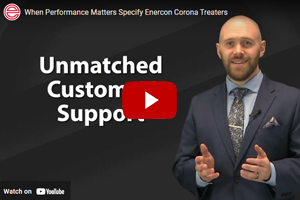Pressure on Paper Packaging Converters
- Published: March 25, 2024
How Label Suppliers are Key to Meeting Sustainability Goals
By Amy Donato, PPG Global Platform Director, TESLIN®
The data doesn’t lie. The World Bank predicts that without drastic actions, global waste will increase to 3.4 billion metric tons by 20501 — an increase of 70 percent from today. And while we think about paper packaging and labels as a sustainable option because they are recyclable or biodegradable, they use a lot of energy and water to produce.
Consumers, brand owners and packaging converters are prioritizing the need to be more sustainable, not only with products but also in their operations, practices, supplier relationships and transportation of goods.
Why? Consumers are demanding sustainable products and sustainable product packaging. According to a Bain report, in Europe, 71 percent of consumers claim they want to buy sustainable products. In the US, 71 percent of consumers claim they want to buy products with as little packaging as possible. Similarly, a recent global McKinsey report found that consumers value sustainably sourced and manufactured products which has led to 2.7 times faster growth for sustainable products vs. traditional goods, despite price premiums over their conventional counterparts.2
Brands, suppliers and converters are taking action. McKinsey reports that 75 percent of global companies have made sustainable-packaging commitments.3 And a recent survey by the National Association of Manufacturers found that a primary sustainability focus of manufacturers is energy efficiency and reduction.4 While the number of companies in the paper and packaging industry committed to science-based targets has rapidly increased from five companies in 2019 to 164 in 2022, more than 30 percent of those companies are behind on their near-term scope 1 and scope 2 targets. And even more are behind on their scope 3 targets, 5 which are the indirect upstream and downstream emissions that occur in a company’s value chain.
There is room to advance such goals.
Paper packaging converters are all in different stages of their sustainability journeys, with some just beginning and others honing their efforts. So how can they ensure they’re doing everything they can to reach their sustainability goals and those of the brand owners they serve?
The answer lies in strong supplier partnerships. Packaging suppliers can help manufacturers meet their sustainability goals by reducing plastic and raw materials, using bio-based content and light-weighting, without yielding on durability and production productivity.
Let’s look at label suppliers, as one example. Labels can be made from pulp-based paper, synthetic materials such as vinyl, polyester, polypropylene or other plastics, or films/special synthetics. Not only must you consider the facestock of the label itself, but also the inks and coatings utilized, the adhesive, and in the case of self-adhesive labels, the liner material as well. There are a myriad combinations and options to use based on the container the label has to adhere to, such as plastic, glass, paper, wood, metal, and the environmental conditions, from indoor/outdoor usage to moisture and ranging temperatures. Consistently, labels must be versatile, extremely printable and ensure the image of brand comes across clearly despite these varying factors. That’s not an easy combination to solve.
Suppliers Who Help to Solve Problems
Converters are seeking substrates that solve unique problems for their customers. For example, converter sourcing departments regularly partner with labelstock suppliers who supply facestocks that work well with specific print processes – fixed and variable printing methods – including inkjet, laser and thermal transfer. Ultimately, this reduces complexity for the converter, which generally uses multiple print technologies. Unfortunately, not all substrates run well or can be printed on different technologies. Luckily, there are unique synthetic paper labels that fulfill these requirements while simultaneously reducing plastic usage by up to 50 percent. This leads to the usage of fewer raw materials and a reduction of waste in landfills.
Labels that Don’t Compromise the Brand
In addition, brands remain focused on the look, feel and integrity of the brand itself. How the packaging and label appear on the shelf at retailers, as well as e-commerce, matters to both the brand owners and the consumers. Brand owners are craving packaging and labels that both enhance the brand and help meet their sustainability goals. This translates to ensuring a proper label that is highly printable with accurate colors, as well as one that supports sustainability goals.
Labelstock Suppliers Who Also Prioritize Sustainability
Companies and citizens have a responsibility to take action to reduce negative impacts on the environment.
Find a labelstock supplier that also prioritizes sustainability. One who is willing to help track processes, data and fill out your scorecards (and the scorecards of your customers). A supplier partner must work to overcome challenges and solve problems with you and your customers.
Consumers hold more leverage than ever before. They’re demanding, not requesting, more sustainable products and packaging without compromising the quality they’ve come to know and expect. Brand owners, converters and suppliers must work together across the value chain to solve these unique demands, while continuing to innovate and increase profit margins.
Is your labelstock supplier helping you solve these unique challenges?
1 https://openknowledge.worldbank.org/entities/publication/d3f9d45e-115f-559b-b14f-28552410e90a
5 https://www.bain.com/insights/putting-sustainability-to-work-paper-and-packaging-report-2023/
About the Author
Amy Donato is PPG’s Global Platform Director for TESLIN® substrate — a synthetic facestock for printed labels. She has nearly two decades of experience in marketing and sales for consumer and B2B industries. She earned a B.S.B.A in marketing from the University of Pittsburgh and an M.B.A. from West Virginia University.









